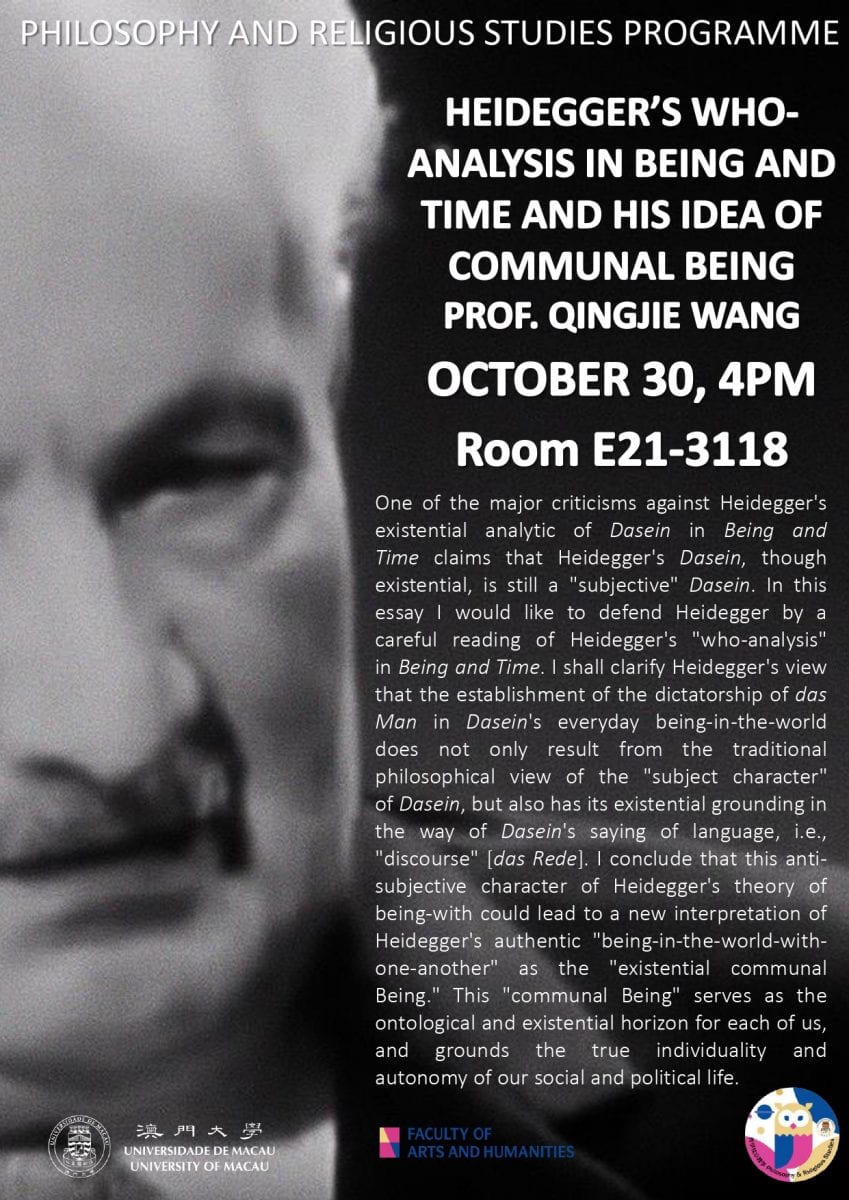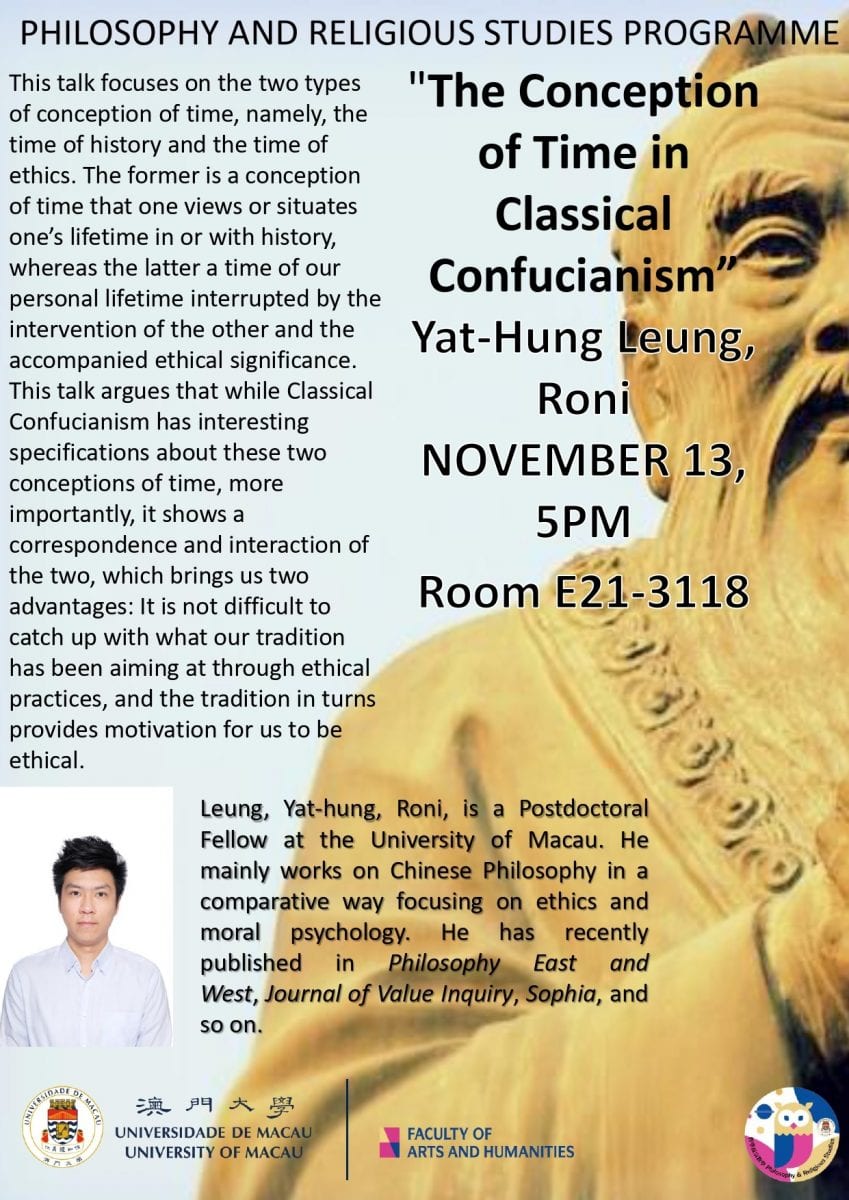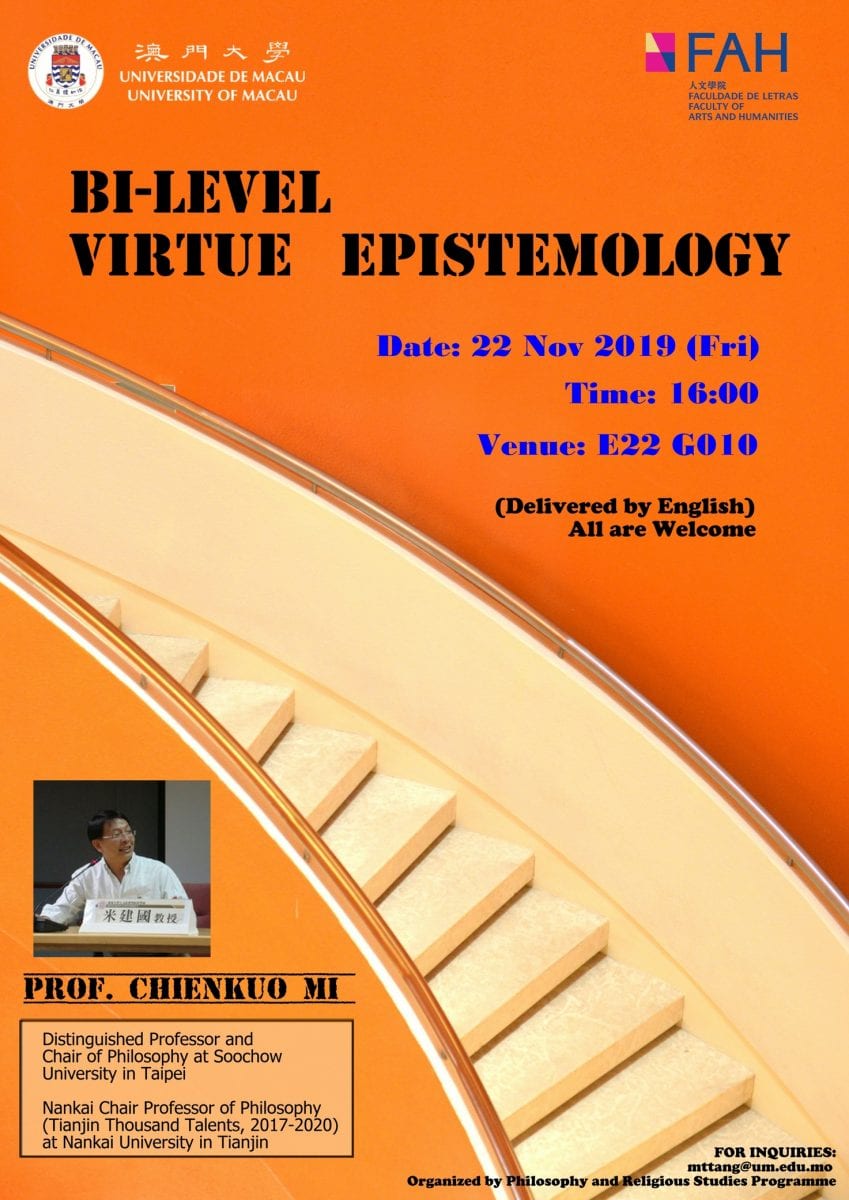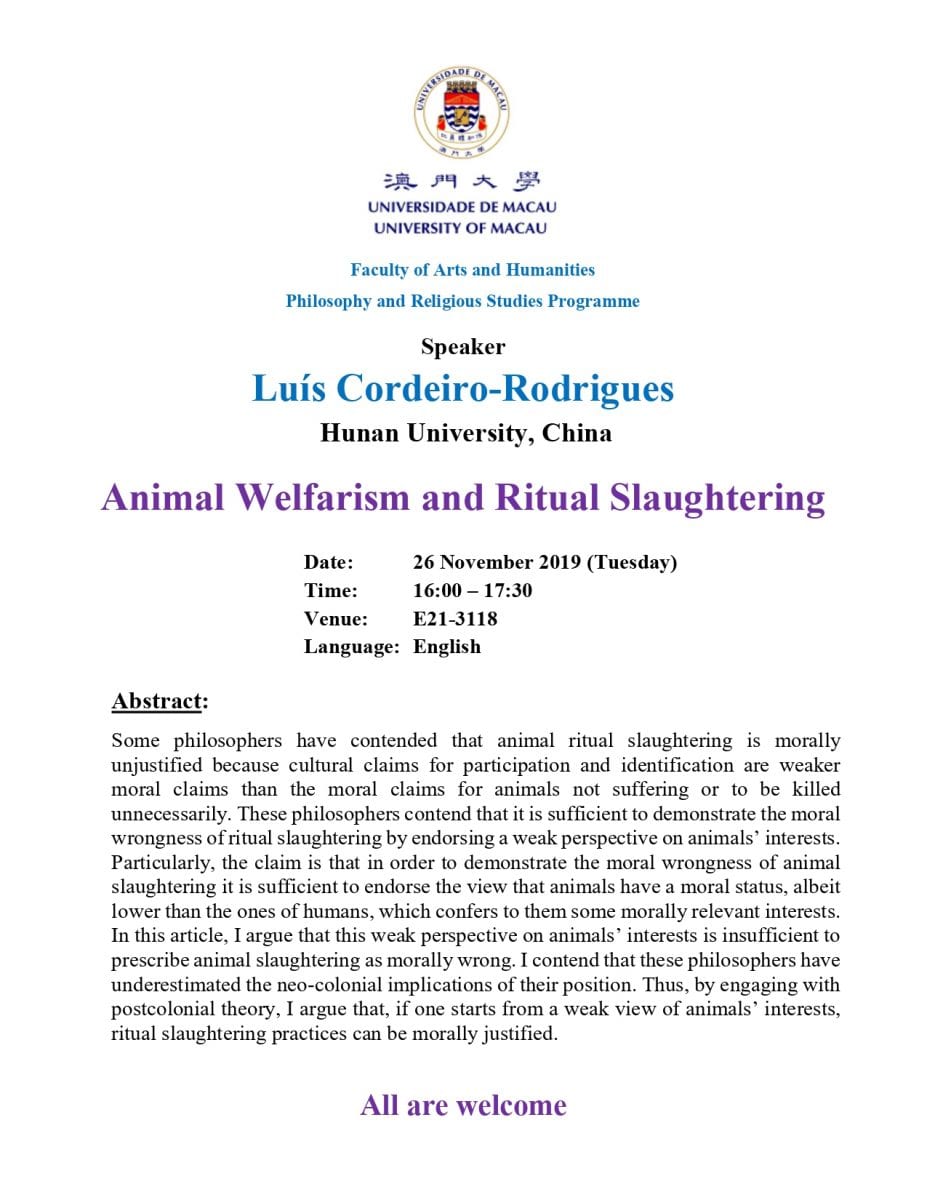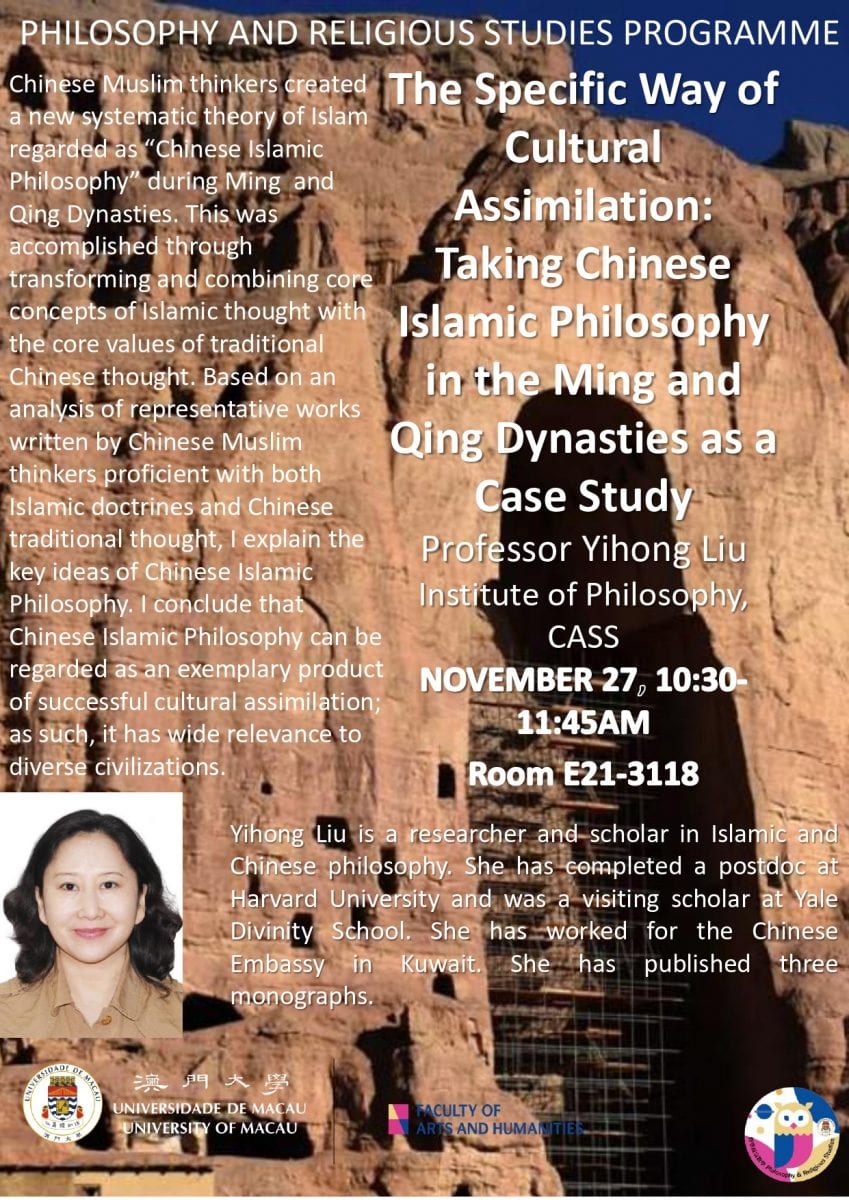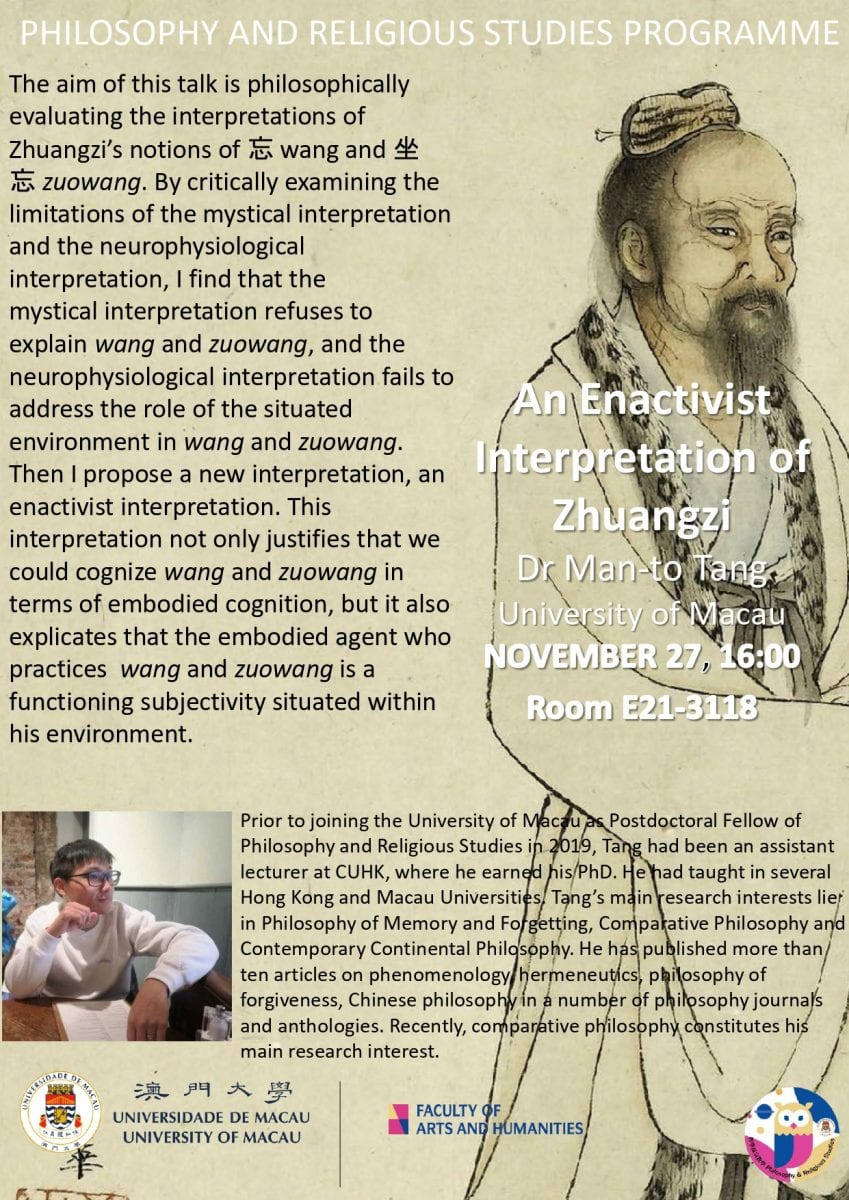Calendar of Events
M Mon
T Tue
W Wed
T Thu
F Fri
S Sat
S Sun
0 events,
0 events,
0 events,
0 events,
0 events,
0 events,
0 events,
0 events,
0 events,
0 events,
0 events,
0 events,
0 events,
0 events,
0 events,
1 event,
FAH/PHIL Philosophy and Religious Studies Lecture Series – “The Conception of Time in Classical Confucianism: The Correspondence and Interaction between the Time of History and the Time of Ethics” by Dr. Leung Yat Hung
FAH/PHIL Philosophy and Religious Studies Lecture Series – “The Conception of Time in Classical Confucianism: The Correspondence and Interaction between the Time of History and the Time of Ethics” by Dr. Leung Yat Hung
Abstract This talk focuses on the two types of conception of time, namely, the time of history and the time of ethics. The former is a conception of time that one views or situates one’s lifetime in or with history, whereas the latter a time of our personal lifetime interrupted by the intervention of the other and the accompanied ethical significance. This talk argues that while Classical Confucianism has interesting specifications about these two conceptions of time, more importantly, it shows a correspondence and interaction of the two, which brings us two advantages: It is not difficult to catch up with what our tradition has been aiming at through ethical practices, and the tradition in turns provides motivation for us […]
0 events,
0 events,
0 events,
0 events,
0 events,
0 events,
0 events,
0 events,
1 event,
FAH/PHIL Guest Lecture – “Bi-Level Virtue Epistemology” by Prof. Mi Chienkuo, Soochow University, Taiwan
FAH/PHIL Guest Lecture – “Bi-Level Virtue Epistemology” by Prof. Mi Chienkuo, Soochow University, Taiwan
Abstract At the beginning, I would bring in Ernest Sosa’s project of performance-based normativity, in which the 3-A model of evaluating a performance is introduced. That means, in order to be a good performance, three important elements are required: they are accuracy, adroitness, and aptness. In addition, the model can be stacked up and move from aptness to meta-aptness and full aptness. And then, I will continue to explore action-based normativity (or agency-based normativity), in which we can obtain two frameworks of human actions or agency: Framework I: The loosely deontic framework (one that highlights functional and mechanical faculties). It is an intermediate region, which admits a kind of agency involved in functional actions, the unfree agency of proper functioning. […]
0 events,
0 events,
0 events,
1 event,
FAH/PHIL Guest Lecture – “Animal Welfarism and Ritual Slaughtering” by Prof. Luís Cordeiro-Rodrigues, Hunan University, China
FAH/PHIL Guest Lecture – “Animal Welfarism and Ritual Slaughtering” by Prof. Luís Cordeiro-Rodrigues, Hunan University, China
Abstract: Some philosophers have contended that animal ritual slaughtering is morally unjustified because cultural claims for participation and identification are weaker moral claims than the moral claims for animals not suffering or to be killed unnecessarily. These philosophers contend that it is sufficient to demonstrate the moral wrongness of ritual slaughtering by endorsing a weak perspective on animals’ interests. Particularly, the claim is that in order to demonstrate the moral wrongness of animal slaughtering it is sufficient to endorse the view that animals have a moral status, albeit lower than the ones of humans, which confers to them some morally relevant interests. In this article, I argue that this weak perspective on animals’ interests is insufficient to prescribe animal slaughtering […]
2 events,
FAH/PHIL Guest Lecture – “The Specific Way of Cultural Assimilation – Taking Chinese Islamic Philosophy in the Ming and Qing Dynasties as a Case Study” by Prof. Liu Yi-hong, Chinese Academy of Social Sciences, China
FAH/PHIL Guest Lecture – “The Specific Way of Cultural Assimilation – Taking Chinese Islamic Philosophy in the Ming and Qing Dynasties as a Case Study” by Prof. Liu Yi-hong, Chinese Academy of Social Sciences, China
Abstract Chinese Muslim thinkers created a new systematic theory of Islam regarded as “Chinese Islamic Philosophy” during Ming (1368-1644) and Qing (1644-1911) Dynasties. This was accomplished through transforming and combining core concepts of Islamic thought with the core values of traditional Chinese thought. Based on an analysis of representative works written by Chinese Muslim thinkers proficient with both Islamic doctrines and Chinese traditional thought, I explain the key ideas of Chinese Islamic Philosophy. I conclude that Chinese Islamic Philosophy can be regarded as an exemplary product of successful cultural assimilation; as such, it has wide relevance to diverse civilizations.
FAH/PHIL Philosophy and Religious Studies Lecture Series – “An Enactivist Interpretation of Zhuangzi” by Dr. Tang Man To
FAH/PHIL Philosophy and Religious Studies Lecture Series – “An Enactivist Interpretation of Zhuangzi” by Dr. Tang Man To
Abstract: The aim of this talk is philosophically evaluating the interpretations of Zhuangzi’s notions of 忘 wang and 坐忘 zuowang. By critically examining the limitations of the mystical interpretation and the neurophysiological interpretation, I find that the mystical interpretation refuses to explain wang and zuowang, and the neurophysiological interpretation fails to address the role of the situated environment in wang and zuowang. Then I propose a new interpretation, an enactivist interpretation. This interpretation not only justifies that we could cognize wang and zuowang in terms of embodied cognition, but it also explicates that the embodied agent who practices wang and zuowang is a functioning subjectivity situated within his environment. Bio: Prior to joining the University of Macau as Postdoctoral Fellow of Philosophy and Religious Studies in 2019, Tang had been an assistant lecturer at CUHK, […]


